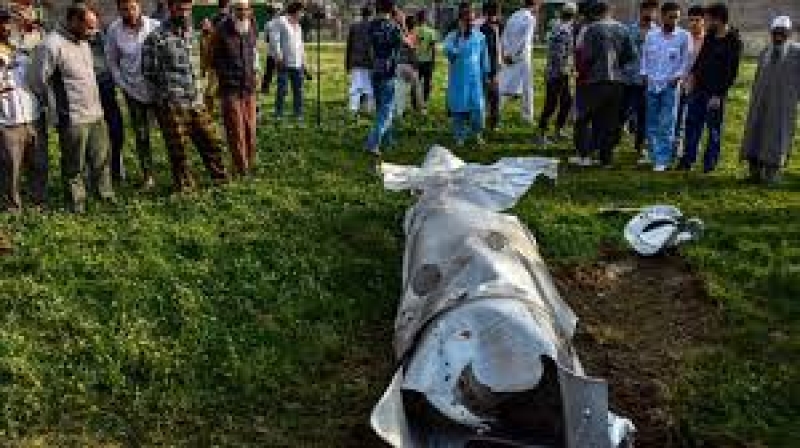- UNRWA Situation Report on Crisis in Gaza & Occupied West Bank |
- Intimidation or bloodshed cannot halt Bangladesh’s march to democracy |
- Khaleda Zia integral to an important chapter in BD history: Yunus |
- Enthusiasm marks Victory Day celebrations across Bangladesh |
- Dhaka-Delhi ties deep; to be shaped by trust, dignity, mutual respect |
Pakistan vows revenge after Indian strikes raise tensions

Pakistan has vowed to avenge the deaths of 31 people killed in Indian missile strikes that New Delhi described as retaliation for a deadly assault on Indian tourists in Kashmir last month.
Calling the strikes an “act of war,” Pakistan claimed it downed several Indian fighter jets and warned of consequences. The missile attacks hit areas in Pakistan-administered Kashmir and Punjab province, killing civilians including women and children, Pakistan’s military said, according to an AP report.
India's Defense Ministry said the strikes targeted at least nine sites “where terrorist attacks against India have been planned.” Among the structures hit were two mosques.
Pakistani Prime Minister Shehbaz Sharif said his country would avenge the dead but gave no details, fanning fears of all-out conflict between the nuclear-armed rivals. Already, it’s their worst confrontation since 2019, when they came close to war.
Additionally, in a televised address he said, “My Pakistani people, for your own safety, our army and our people, we will always be united. We will definitely stand against them [India] and win,” he said in a televised address. “Because we are all fighting for the truth, hopefully god will always be with us,” he added, BBC reports.
Sharif commended the armed forces for shooting down five Indian jets, which he said were hit after they fired their missiles but while still in Indian airspace.
There was no comment from India, but three planes fell onto villages in India-controlled territory, according to police and residents.
The latest hostilities have sparked fears of a broader military confrontation between the two nuclear-armed neighbours. This is their most serious escalation since 2019, when both countries engaged in aerial combat after a suicide bombing killed dozens of Indian paramilitary troops in Kashmir.
Heavy exchange of cross-border fire continued following the missile strikes, with both sides reporting casualties, according to AP.
In Islamabad, Pakistan's Health Minister Mustafa Kamal announced the cancellation of all scheduled leave for doctors, nurses, and other medical personnel working in public hospitals, directing them to report for duty immediately. “Urgent measures” have been introduced “in response to the crisis,” Kamal said.
International concern is mounting. In comments from the Oval Office, Trump said, “I know both very well. I want to see them work it out. I want to see them stop. If I can do anything to help, I will be there.”
A spokesperson for the US State Department said the United States is “closely monitoring” the situation and remains in contact with both India and Pakistan.
“We urge the countries to work towards a responsible resolution that maintains long-term peace and regional stability in South Asia,” the spokesperson said, BBC reports.
US Secretary of State Marco Rubio reiterated earlier remarks by President Donald Trump, saying he hoped the violence “ends quickly” and that the United States “will work towards a peaceful resolution.”
The UK government also urged India and Pakistan to show restraint and engage in direct dialogue to find a swift, diplomatic path forward.
"Current tensions between India and Pakistan are a serious concern," UK Foreign Secretary David Lammy said in a statement on Wednesday.
David Lammy mentioned that the UK has close and unique relationships with both the countries.
"I have made clear to my counterparts in India and Pakistan that if this escalates further, nobody wins," he added.
Tensions have soared between the neighbours since the April attack in which gunmen killed 26 people, mostly Indian tourists.
India accuses Pakistan of being behind the attack, which was claimed by a militant group calling itself Kashmir Resistance. India has said the group is linked to Lashkar-e-Taiba, a disbanded Pakistani militant group that New Delhi long accused of being backed by Pakistan.
Islamabad denies involvement.
India and Pakistan have fought two of their three wars over the Himalayan region of Kashmir, which is split between them and claimed by both in its entirety.
In the wake of the massacre, the rivals have expelled each other’s diplomats and nationals, closed their borders and shuttered airspace. India has also suspended a critical water-sharing treaty with Pakistan.

